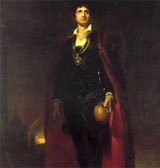 Hamlet offers an excellent example of why many modern editions of Shakespeare’s plays can’t be entirely trusted. While the traditions of emendation which have arisen around each play over the past 400 years have generally improved the texts, some of these traditions are both radically incorrect and yet rabidly stubborn in their persistence. It can be truly amazing to return to the original texts (imperfect as they may be) and discover that things you thought were fundamental to a play were, in fact, concocted out of whole cloth by an essentially random bloke in the 18th century.
Hamlet offers an excellent example of why many modern editions of Shakespeare’s plays can’t be entirely trusted. While the traditions of emendation which have arisen around each play over the past 400 years have generally improved the texts, some of these traditions are both radically incorrect and yet rabidly stubborn in their persistence. It can be truly amazing to return to the original texts (imperfect as they may be) and discover that things you thought were fundamental to a play were, in fact, concocted out of whole cloth by an essentially random bloke in the 18th century.
(This is why preparing fresh scripts from the original sources is an important part of the Complete Readings of William Shakespeare.)
If you’ve got a copy of Hamlet handy, I invite you to flip it open to scene 1.5 and find these lines:
HAMLET My tables, my tables, meet it is I set it down
That one may smile, and smile, and be a villain!
At least I’m sure it may be so in Denmark.
I can virtually guarantee you that near these lines you will find the stage direction “Writing”, “Hamlet writes”, or the like. And if it isn’t on the line itself, then you’ll find it in the notes. (As with the third Arden edition, which reads in its notes: “Hamlet now produces a literal writing tablet or notebook.”)
Now, it is absolutely true that “tables” is an archaic term meaning “tablet”. But I can absolutely guarantee you that Shakespeare never intended for Hamlet to yank out a notebook and begin jotting down the minutes of his meeting with the Ghost.
Why can I do that? First, because the stage direction doesn’t appear in the original texts. Second, because this passage reads, in its entirety:
… Remember thee?
Yea, from the table of my memory
I’ll wipe away all trivial fond records,
All saws of books, all forms, all pressures past
That youth and observation copied there,
And thy commandment all alone shall live
Within the book and volume of my brain
Unmix’d with baser matter; yes, by heaven.
O most pernicious woman!
O villain, villain, smiling, damned villain!
My tables; meet it is I set it down,
That one may smile, and smile, and be a villain,
At least I’m sure it may be so in Denmark.
“The table of my memory.”
Never has a clearer metaphor been written. And yet when the metaphor is reinvoked a mere 9 lines later, modern editors universally interpret it in the most literal of fashions and jam in the stage direction. The direction itself was originally created by Nicholas Rowe in 1709 as part of what can arguably be called the first modern edition of the play, and it’s stuck fast ever since. Arden, Oxford, Riverside, Yale, Folger, New Cambridge… You can even find it in the Klingon Hamlet. I have literally never seen a printed copy of the play that didn’t include the direction in some form (except facsimiles and other editions seeking to present the original text without editorial correction), and for ten years now I’ve made a habit of picking up any copy of the play I come across and flipping it open to the incriminating passage.
How is this possible? I surely don’t know.
What I do know is that this misguided editorial tradition has had a tremendous impact on the performance history of the play. As early as 1755 we have written records of an audience member complaining, “‘Tis absurd to suppose that Hamlet actually stood in need of tables to refresh his memory upon so affecting an occasion.” The jarring nature of Hamlet “stopping his action” to pull out pen and paper has often left performers seeking an alternative: John Gielgud apologized for excluding this bit of business from his performance. Mel Gibson seized his sword and attempted to carve the words into the stone walls of Elsinore. Others have writ the words in their own blood.
On the other hand, there are those who have fully embraced the direction. In the 2000 National Theater production of the play, for example, it became a central pillar of Simon Russell Beale’s performance as he carried a small notebook and pen throughout the play, jotting down notes as the moments suited him. While the conceit is fascinating (one could even imagine such a diary being given over to the charge of Horatio at the end of the play), there seems little doubt in my mind that it would not have arisen if not for this errant stage direction.
Originally posted on November 20th, 2010.












Fascinating. Thank you for reposting this.